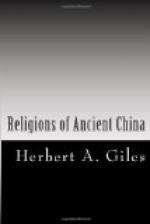Divination.—Divination seems to have been practised in China from the earliest ages. The implements used were the shell of the tortoise, spiritualised by the long life of its occupant, and the stalks of a kind of grass, to which also spiritual powers had for some reason or other been attributed. These were the methods, we are told, by which the ancient Kings made their people revere spirits, obey the law, and settle all their doubts. God gave these spiritual boons to mankind, and the sages took advantage of them. “To explore what is complex, to search out what is hidden, to hook up what lies deep, and to reach to what is distant, thereby determining the issues for good or ill of all events under the sky, and making all men full of strenuous endeavour, there are no agencies greater than those of the stalks and the tortoise shell.”
In B.C. 2224, when the Emperor Shun wished to associate the Great Yu with him in the government, the latter begged that recourse might be had to divination, in order to discover the most suitable among the Ministers for this exalted position. The Emperor refused, saying that his choice had already been confirmed by the body of Ministers. “The spirits too have signified their assent, the tortoise and grass having both concurred. Divination, when fortunate, may not be repeated.”
Sincerity, on which Confucius lays such especial stress, is closely associated with success in divination. “Sincerity is of God; cultivation of sincerity is of man. He who is naturally sincere is he who hits his mark without effort, and without thinking apprehends. He easily keeps to the golden mean; he is inspired. He who cultivates sincerity is he who chooses what is good and holds fast to it.
“It is characteristic of the most entire sincerity to be able to foreknow. When a State or a family is about to flourish, there are sure to be happy omens; and when it is about to perish, there are sure to be unpropitious omens. The events portended are set forth by the divining-grass and the tortoise. When calamity or good fortune may be about to come, the evil or the good will be foreknown by the perfectly sincere man, who may therefore be compared with a spirit.”




